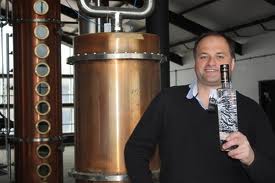
Cheer up, we're living in awful times.
That's pretty much the message you'd take from William Chase -- who ought to know. His entire fortune has been won through adversity. As the man who's now exporting vodka to Russia, he knows a lot about bucking trends.

Chase didn't graduate high school. He took on huge debt to stay in farming and by 1992 was bankrupt. He went into potato trading -- acting for farmers dealing with supermarkets. And he didn't like what he saw, as the big chains so dominated retail distribution that, if you didn't sell to them, you didn't sell at all. But Chase wasn't -- isn't -- one to give up lightly.
Instead, he started producing hand fried potato chips that looked, smelled and tasted wonderful. And he refused to sell them to big supermarkets. Farm stores, small independent retailers could have them, but when supermarkets tried to sell his product, he sued them -- and won. Learning his story, consumers cheered -- and bought. That story alone sold the product; that the chips tasted great certainly helped. In 2008, Chase sold his business for $50 million.
Feeling lost without his chip business, Chase turned to vodka -- using potatoes, again, to produce spirits the old fashioned way. This year, after just three years of production, Chase's vodka triumphed in blind tastings at the San Francisco World Spirits Competition, beating 249 rivals from around the globe.
It's striking that Chase's two business successes have taken place against a backdrop of economic gloom. If agriculture hadn't been doomed, I wondered, would he ever have discovered just how much he was capable of?
"No, I don't think so," he admitted. "If the farming had been okay, I'd probably still be a farmer. But then I think about 90 percent of people are in the wrong job. Maybe I was in the wrong job. Most people have no idea what they're capable of."
That such stories emerge in recessions doesn't transform grim days into cakewalks. But it may not be so accidental that, historically, many great companies emerge in economic downturns. Or, as James Baldwin once told me, sometimes your bad luck is your good luck.